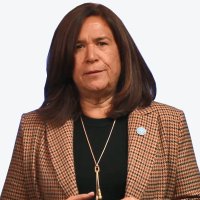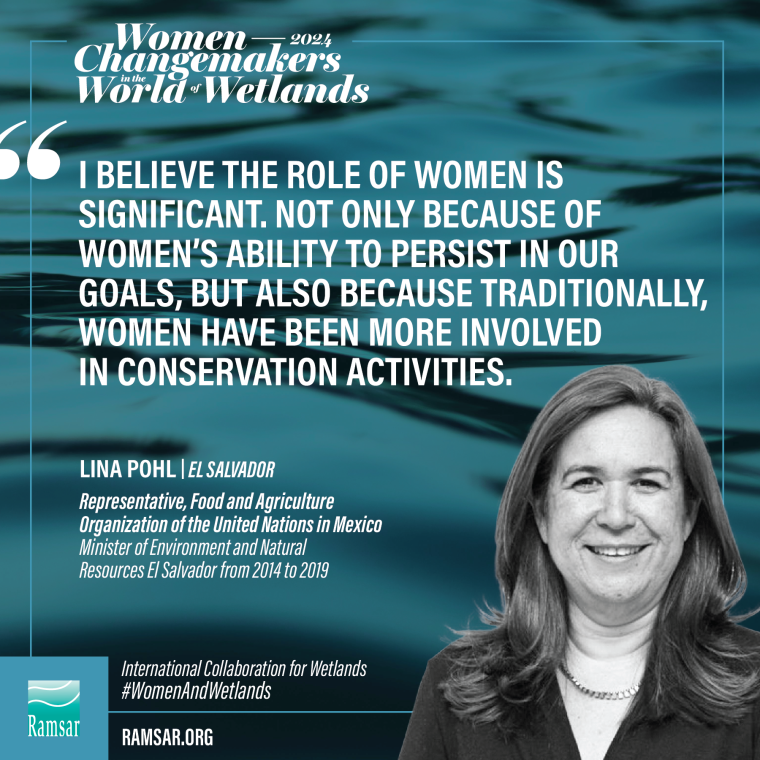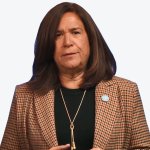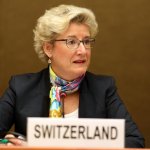
Lina Pohl
Representative, Food and Agriculture Organization of the United Nations in Mexico.
Biography
Lina Dolores Pohl, a Salvadoran national, has held prominent roles in environmental governance and advocacy throughout her career. Serving as Vice Minister of Environment and Natural Resources for El Salvador, she spearheaded initiatives such as the establishment of the Presidency of the Fund for the Americas Initiative and the Presidency of the Ibero-American and Caribbean Network of MaB Committees and Biosphere Reserves (IBEROMAB). Her contributions extended to various boards and commissions, including the Social Investment Fund for Local Development (FISDL) and the Salvadoran Tourism Corporation (CORSATUR).
Pohl's dedication to environmental causes continued in her role as Minister of Environment and Natural Resources, where she played a pivotal role in proposing the United Nations Decade on Ecosystem Restoration 2021-2030, subsequently adopted by the UN General Assembly. Her leadership garnered international recognition, including the prestigious National Order of the Legion of Honor from France for her efforts during the 21st Conference of the Parties to the UN Framework Convention on Climate Change (COP21).
Before her ministerial tenure, Pohl held the position of Director for Central America at the Heinrich Böll Foundation, where she oversaw strategic implementation and regional coordination. Additionally, she actively participated in humanitarian efforts following the devastation caused by Hurricane Mitch in 1999.
Pohl's academic background is equally impressive, with a Bachelor's degree in Sociology from the José Simeón Cañas Central American University (UCA) and Master's degree in Social Sciences from the Latin American Faculty of Social Sciences (FLACSO) in Mexico and Economics from the Autonomous University of Madrid, Spain.
Currently serving as the Representative in Mexico for the Food and Agriculture Organization (FAO) of the United Nations, Pohl continues to be a driving force in advancing sustainable development and environmental conservation efforts in the region.

Questions and Answers
What personal experience has shaped or inspired your journey?
Central America is a region with high levels of biodiversity, one of the five megadiverse places on the planet, and since I was very young, I have enjoyed nature, wetlands, forests, landscapes, and seascapes, making me appreciate it all. Yet, in the last decades, we have not only seen how natural resources have deteriorated, but we have also lived first-hand, the threats and effects of climate change, risking people’s livelihoods and wellbeing. That made me think about how I could make a direct impact and influence in this situation, on how to restore what we had lost; because I truly believe that it is possible, we can restore wetlands, and other ecosystems and landscapes.
We just have to look for solutions and alternatives, and I have spent the last twenty-five years of my life doing this. It would be a dream come true to talk of a Biodiverse Corridor instead of a Dry one, and I am sure this will happen. That is why, in my capacity as Minister of Environment of El Salvador, I spearheaded the Decade of Ecosystem Restoration 2021-2030 within the framework of the United Nations.
At first, it felt a bit intimidating to say “We will lead this initiative” being such a small
country, and for some, El Salvador barely appears on the map, or people might not even know where we are located. But we understood that we are all part of the same planet; we had to do it and it didn’t matter how small we are, we cannot evade our responsibility, we either do it in this next decade or we won’t be able to do it later.
In the end, it was more challenging than intimidating. That initiative marked my life because even though it was an initiative of a minister from a small country, we saw the response and support of many countries and regions. More surprisingly, big countries encouraged us to continue with the initiative, which motivated us even more. And then, having institutions such as FAO and UNEP supporting us and seeing an opportunity to channel efforts and actions assured us that we were heading in the right direction, and had to do it.
Who is the influential figure who has inspired your actions, and what specifically about them has been motivating?
It’s difficult to talk about only one person who has inspired me. There have been so many. Firstly, my colleagues in El Salvador with whom we worked on wetland restoration, particularly Jorge Quezada, from whom I learned a lot. Some countries like Germany, Japan, and the United States, supported me greatly throughout my career, also some institutions like GIZ, IUCN, JICA, WRI, among others. The United Nations Conventions on Climate Change, Biodiversity, and Land Degradation as well.
New friends like the Commissioner of Protected Natural Areas of Mexico with a clear and timely vision to protect wetlands. The Director-General of FAO with great foresight designed a new strategic framework for the Organization that articulates the improvement of production and nutrition with the enhancement of the environment and people’s lives, making an extraordinary contribution to ecosystem restoration and food security.
But undoubtedly, those who have inspired me the most are the people who live in wetlands. Just like the wetlands, the people who live in wetlands and enjoy the benefits they provide, the people who simultaneously struggle to conserve them, and experience the impacts of their deterioration, are examples of resilience. I have encountered wonderful stories; tireless environmental fighters.
I will never forget Doña Juanita, who lived in the Jocotal Lagoon Wetland. She valued this wetland for protecting her community from the impacts of a recent hurricane and said she would dedicate her entire life to conserving it in the best possible way. In the end, she became an environmental fighter in the area. She, and many others, are the ones who have inspired me the most.
In your conservation efforts for wetlands, what key challenges did you face and how has this experience fuelled your dedication to making a positive impact?
I think a big challenge is to demonstrate to all sectors of society that restoring wetlands is not merely a philanthropic or charitable endeavor, but on the contrary, it makes an economic sector highly competitive and productive.
Wetland restoration is essential and central for the sustainability of economic activities, ensuring long-term productivity, guaranteeing food security, aiding in climate change adaptation, and directly impacting the well-being and livelihoods of society as a whole.
Another challenge is to generate an enabling environment to allow the mainstreaming of the conservation and restoration of wetlands into national policies and development plans, to mobilize financial resources. Conservation and restoration actions are urgent and necessary measures to reverse the high degree of deterioration of the environment and recover critical ecosystem services, which help in the reduction of disaster risks, increase adaptive capacity, and reduce vulnerability in territories.
Also, I think we need to establish an atmosphere of trust, that will allow, promote, and facilitate a greater active involvement of relevant sectors, motivating and encouraging full participation of the different actors, such as local communities, private companies, the public sector, academia, indigenous peoples and society in general in wetland conservation and restoration activities.
All women in this category : International Collaboration

Elise Allély-Fermé
Director of Conservation Pronatura México.
More information
Lili SUN
Founder and Deputy Board Chairwoman, Mangrove Conservation Foundation
More information
Lina Pohl
Representative, Food and Agriculture Organization of the United Nations in Mexico.
More information